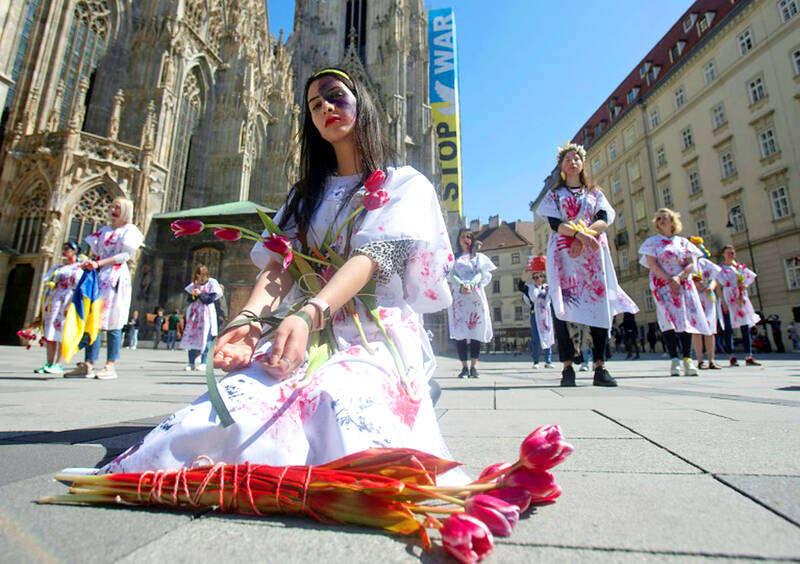When invading Russian troops advanced toward Kyiv and the first explosions rang out in the suburbs, Daria Zymenko took refuge in Gavronshchyna, her parents’ village near the Ukrainian capital.
The Russians took control of Gavronshchyna soon after. One day several soldiers, drunk and armed, burst into the family’s home, saying that Zymenko, an illustrator, must be taken in for questioning.
What happened to the young woman next forms part of what Ukrainian authorities say is a widespread, systematic campaign of sexual abuse by the Russian invaders.

Photo: Alex HALADA via AFP
Zymenko is one of the survivors who have overcome their fear and shame to speak of the horrors that she and countless other Ukrainian women have undergone.
On March 28, 2022, the soldiers took Zymenko to an abandoned house and told her to undress.
“I realized this would not be questioning,” said Zymenko, a 33-year-old with piercing blue eyes. “It lasted for two hours.”
The next day the soldiers returned, raping her again. Soon afterward, Ukrainian forces won back control of the village.
Ukrainian authorities say since Russia invaded in February 2022, they have documented more than 300 cases of sexual violence perpetrated by Russian troops.
However, “the true scale of sexual violence is hard to imagine”, said Oleksandra Matviichuk, head of Ukrainian Center for Civil Liberties, which was awarded the Nobel Peace Prize in 2022. Activists estimate that the number of such cases runs into thousands because many victims prefer to remain silent due to the stigma associated with sexual violence.
“It’s very painful to speak,” Zymenko said in Paris. “But today I feel it’s necessary to explain what I went through, because Russia continues to torture people and commit sexual crimes on a daily basis in Ukraine.”
Last year, Zymenko became a member of SEMA Ukraine, which brings together Ukrainian women who suffered from sexual and gender-based violence as a result of Russia’s invasion.
She said it was “extremely important” to speak out on behalf of those who cannot testify because they are either in Russia-occupied territory or fear stigmatization.
“I want to dismantle this taboo and prevent victims from being stigmatized,” she added.
Last week, Zymenko and several other women took part in a Paris news conference about the “mass rapes” committed by the Russian forces in Ukraine.
Kyiv and the West have accused Russia of numerous war crimes in Ukraine, claims Moscow denies.
Alisa Kovalenko, a documentary filmmaker, estimated that about 80 percent of women who are victims of sexual violence remain silent.
“But the 20 percent who do speak out is already a revolution,” said 36-year-old Kovalenko, whose films have been screened at international films including Cannes this year.
She garnered international attention with her 2015 film Alisa in Warland about the conflict in eastern Ukraine. Kovalenko, who has a young son, is now completing her latest film, Traces, about women who have endured sexual violence during the invasion.
She herself was sexually abused while working on Alisa in Warland in the Donetsk region in 2014, the year Russia annexed Crimea and backed a separatist insurgency in the post-Soviet country.
She was detained as she was leaving the region on May 15, 2014.
“They were convinced I was a sniper,” she said.
Pro-Russian separatists held her for several days, threatening to cut off her ears and fingers, she said.
She was also violated when a Russian officer took her to an apartment in the occupied city of Kramatorsk.
“He forced me to take off my clothes and get into a bathtub,” she said. “Then I was abused.”
Despite her determination to speak out it is hard for Kovalenko to share details of what happened.
Asked if her loved ones knew about the rape, she cried.
It is only recently that she has found the strength to tell them, she said.
After the assault she plunged herself into work and signed up to fight in Ukraine following the full-scale invasion.
Campaigners say the taboo around sexual violence is gradually being lifted in Ukraine.
Iryna Dovgan, the 62-year-old founder of SEMA Ukraine, said more women were now willing to come forward because Russia’s war of aggression was continuing.
“Other women are at risk of being assaulted: This is our cry and our call for help,” Dovgan said last week.
Originally from the region of Donetsk, Dovgan said she was arrested after pro-Russian separatists took up arms against Kyiv in 2014. Accused of supporting the Ukrainian army, she was also abused, she said.
Zymenko said that she had “first decided to forget this awful experience,” but regularly suffered from anxiety attacks and turned to SEMA Ukraine for psychological help.
Kovalenko, who joined the organization in 2019, said she still had nightmares.
“You cannot heal after an experience like that,” she said. “You can only feel better.”

Nauru has started selling passports to fund climate action, but is so far struggling to attract new citizens to the low-lying, largely barren island in the Pacific Ocean. Nauru, one of the world’s smallest nations, has a novel plan to fund its fight against climate change by selling so-called “Golden Passports.” Selling for US$105,000 each, Nauru plans to drum up more than US$5 million in the first year of the “climate resilience citizenship” program. Almost six months after the scheme opened in February, Nauru has so far approved just six applications — covering two families and four individuals. Despite the slow start —

North Korean troops have started removing propaganda loudspeakers used to blare unsettling noises along the border, South Korea’s military said on Saturday, days after Seoul’s new administration dismantled ones on its side of the frontier. The two countries had already halted propaganda broadcasts along the demilitarized zone, Seoul’s military said in June after the election of South Korean President Lee Jae-myung, who is seeking to ease tensions with Pyongyang. The South Korean Ministry of National Defense on Monday last week said it had begun removing loudspeakers from its side of the border as “a practical measure aimed at helping ease

DEADLY TASTE TEST: Erin Patterson tried to kill her estranged husband three times, police said in one of the major claims not heard during her initial trial Australia’s recently convicted mushroom murderer also tried to poison her husband with bolognese pasta and chicken korma curry, according to testimony aired yesterday after a suppression order lapsed. Home cook Erin Patterson was found guilty last month of murdering her husband’s parents and elderly aunt in 2023, lacing their beef Wellington lunch with lethal death cap mushrooms. A series of potentially damning allegations about Patterson’s behavior in the lead-up to the meal were withheld from the jury to give the mother-of-two a fair trial. Supreme Court Justice Christopher Beale yesterday rejected an application to keep these allegations secret. Patterson tried to kill her

CORRUPTION PROBE: ‘I apologize for causing concern to the people, even though I am someone insignificant,’ Kim Keon-hee said ahead of questioning by prosecutors The wife of South Korea’s ousted former president Yoon Suk-yeol yesterday was questioned by a special prosecutor as investigators expanded a probe into suspicions of stock manipulation, bribery and interference in political party nominations. The investigation into Kim Keon-hee is one of three separate special prosecutor probes launched by the government targeting the presidency of Yoon, who was removed from office in April and rearrested last month over his brief imposition of martial law on Dec. 3 last year. The incident came during a seemingly routine standoff with the opposition, who he described as “anti-state” forces abusing their legislative majority to obstruct